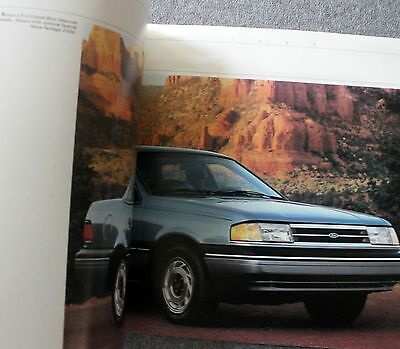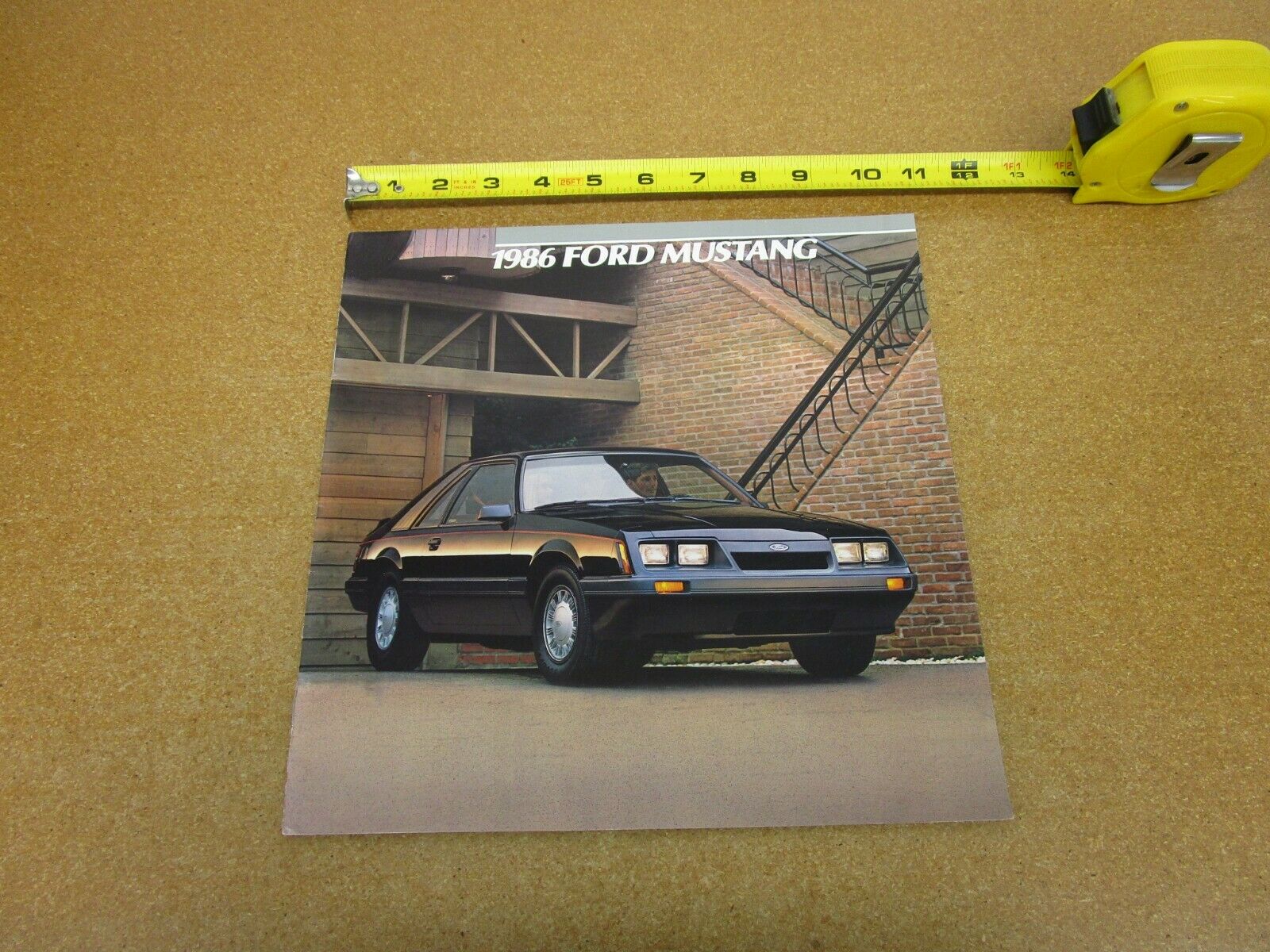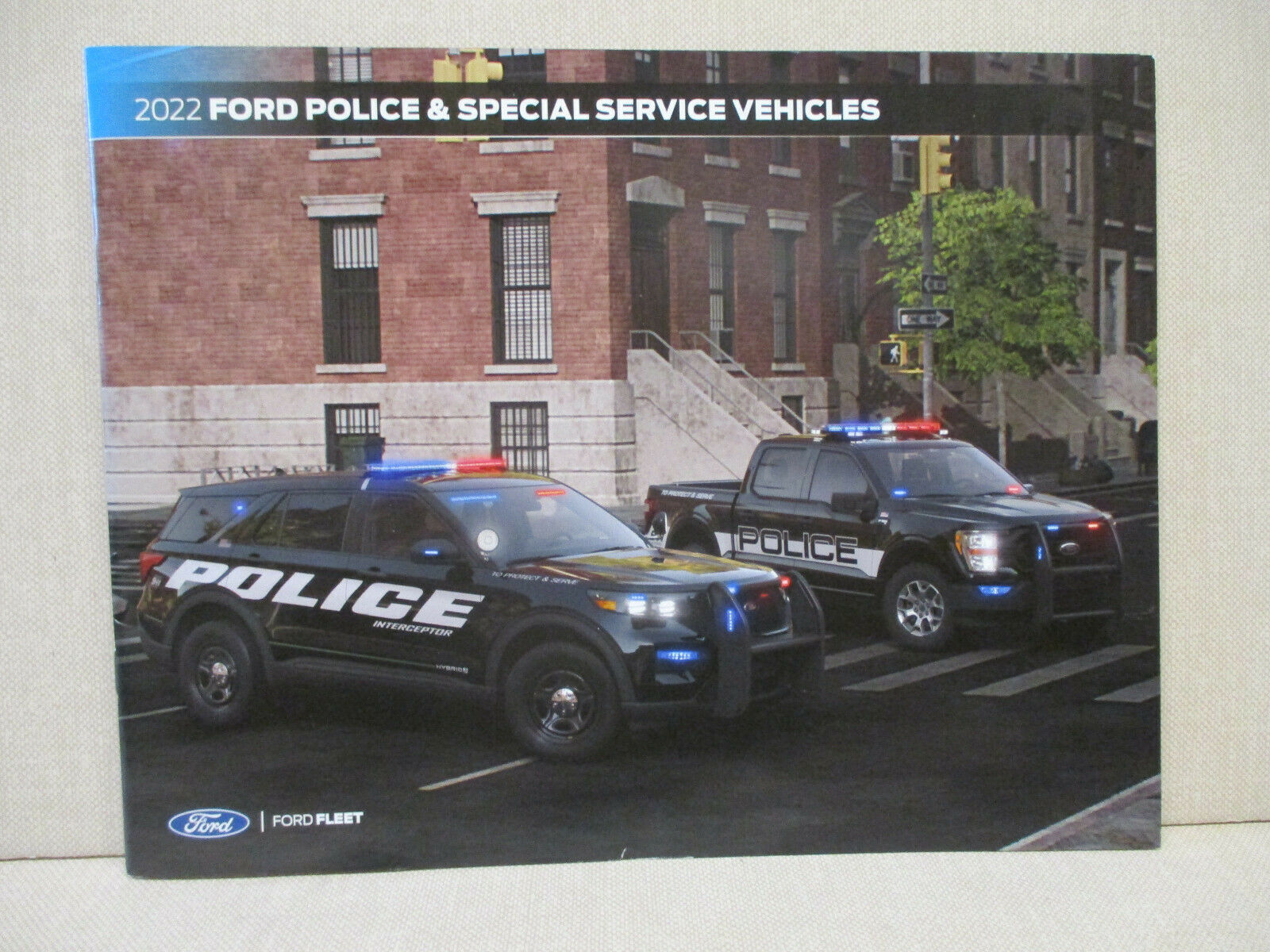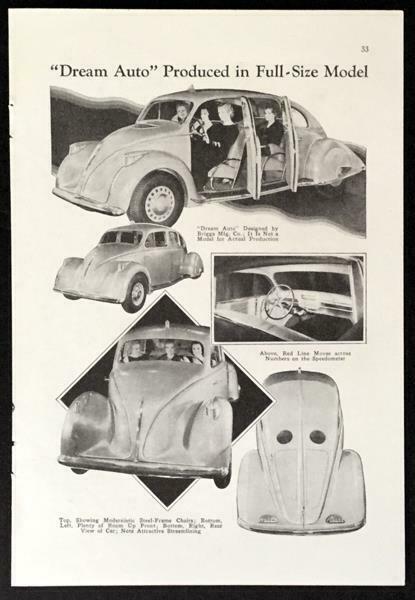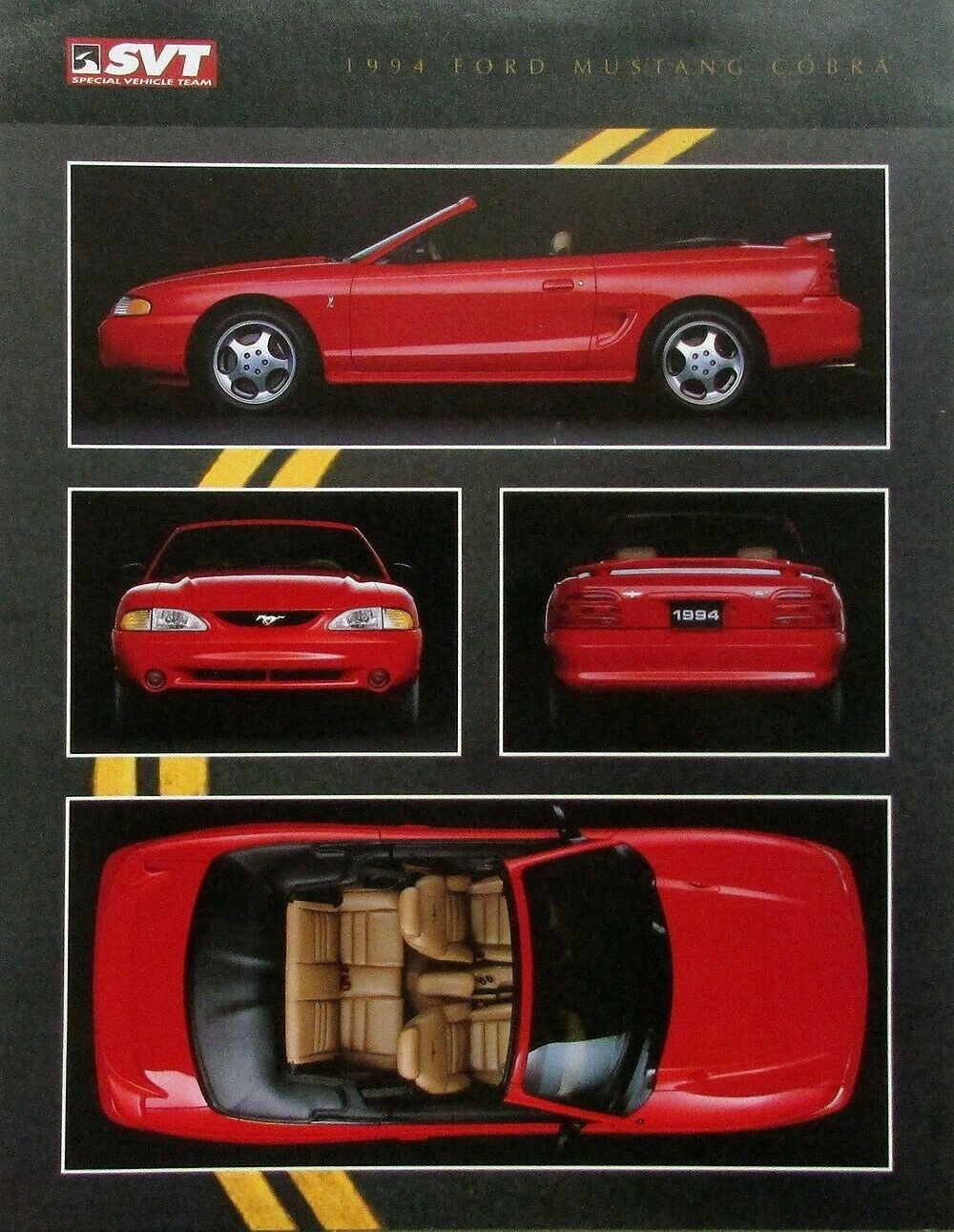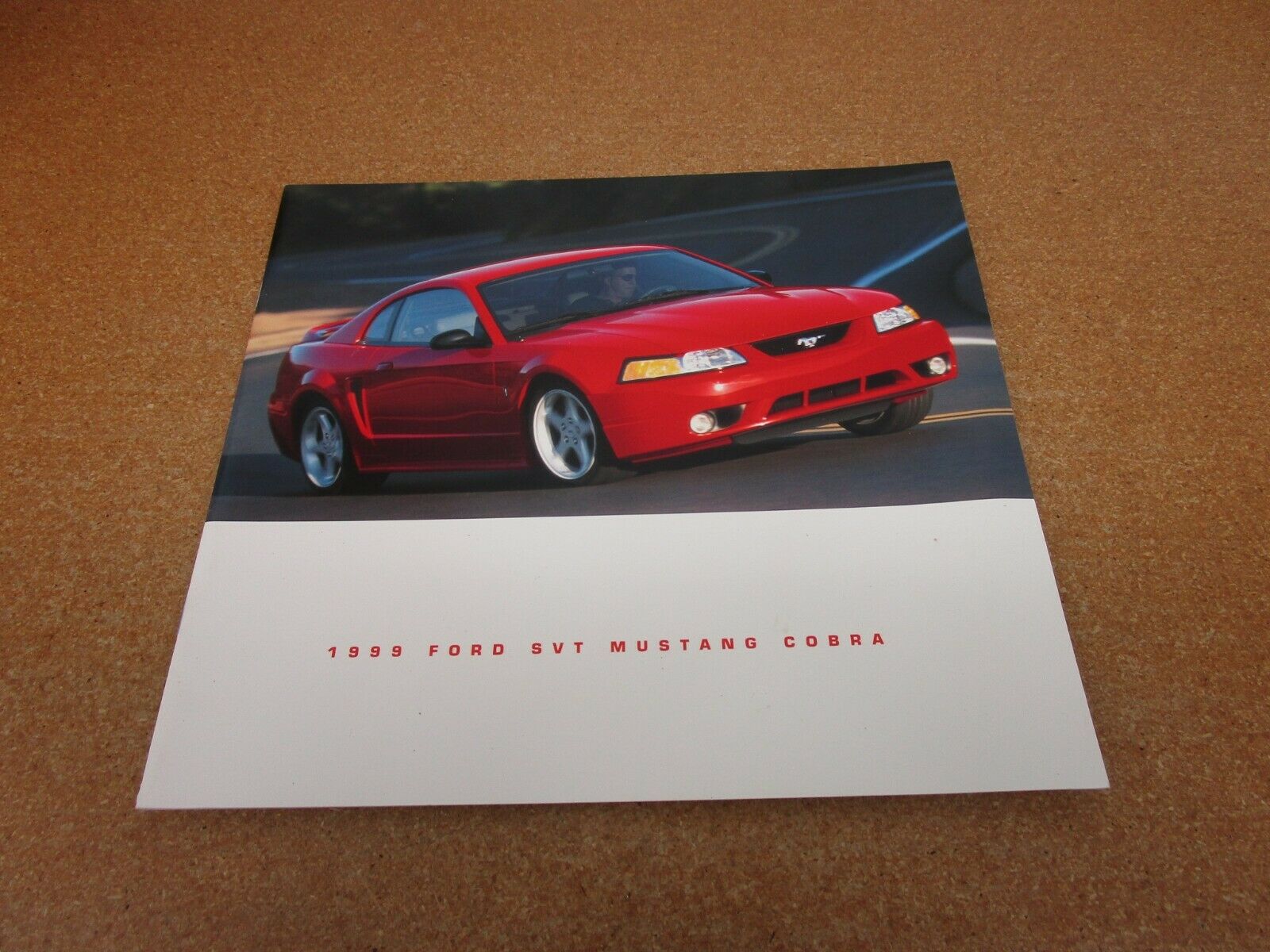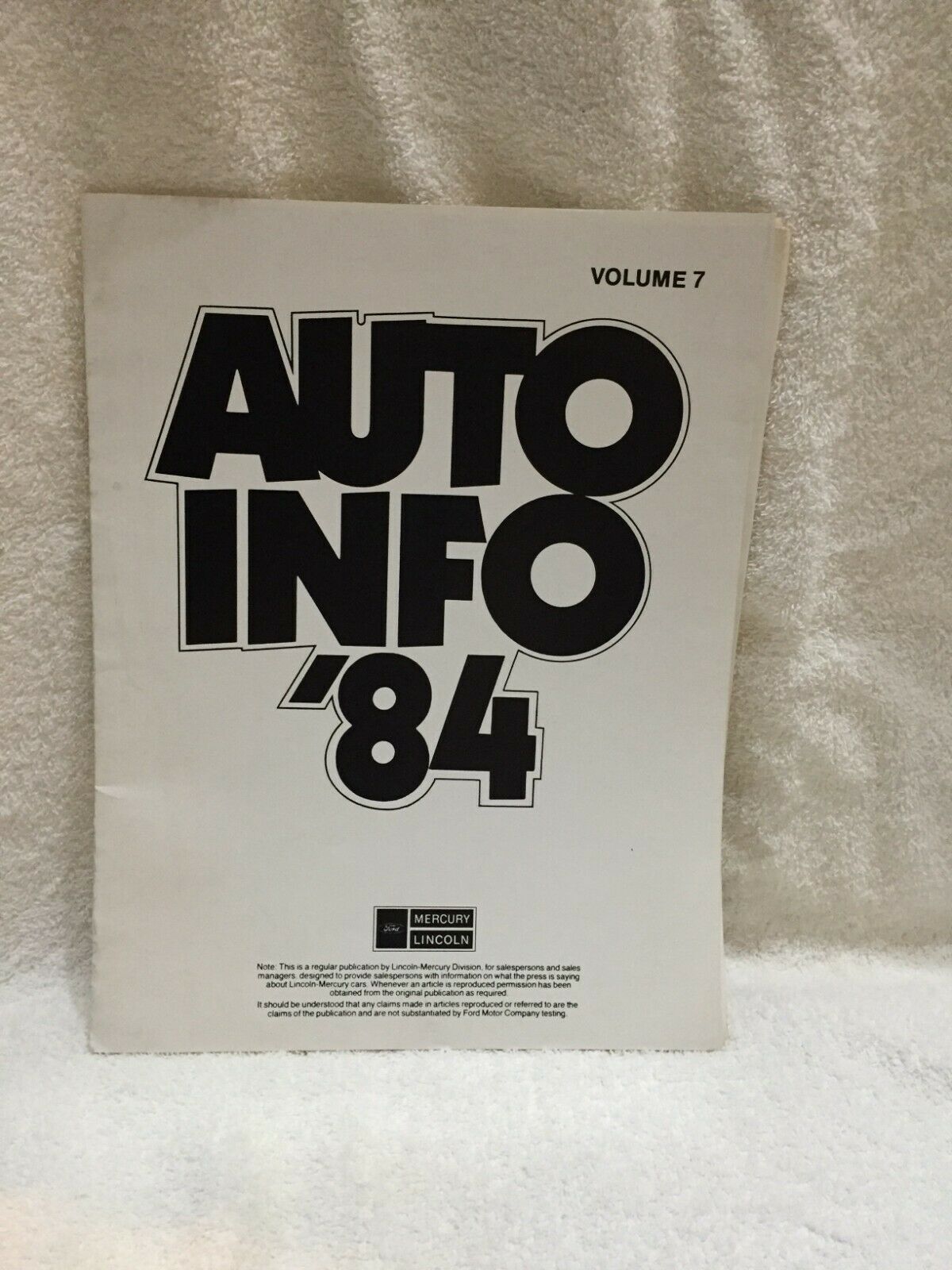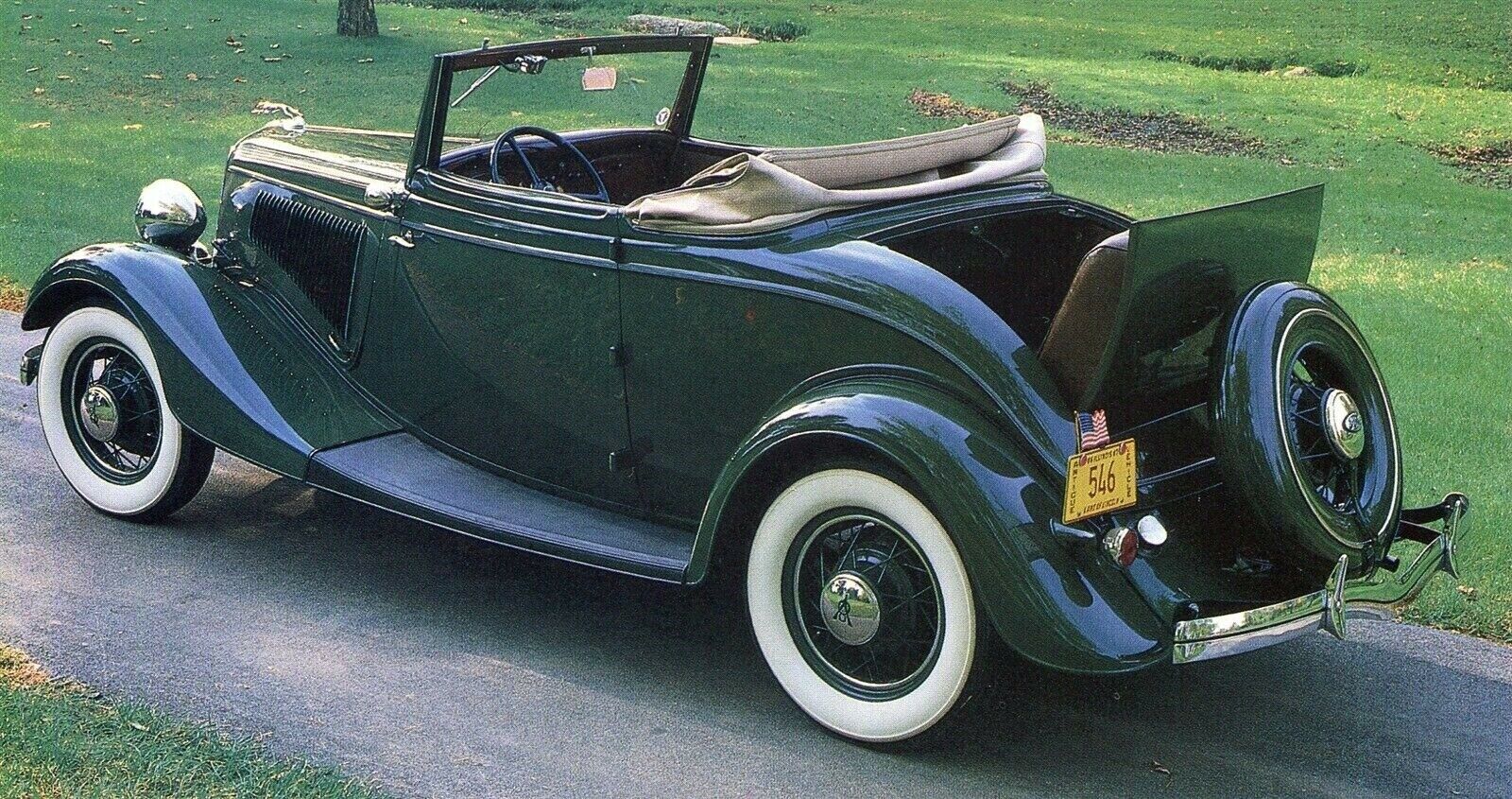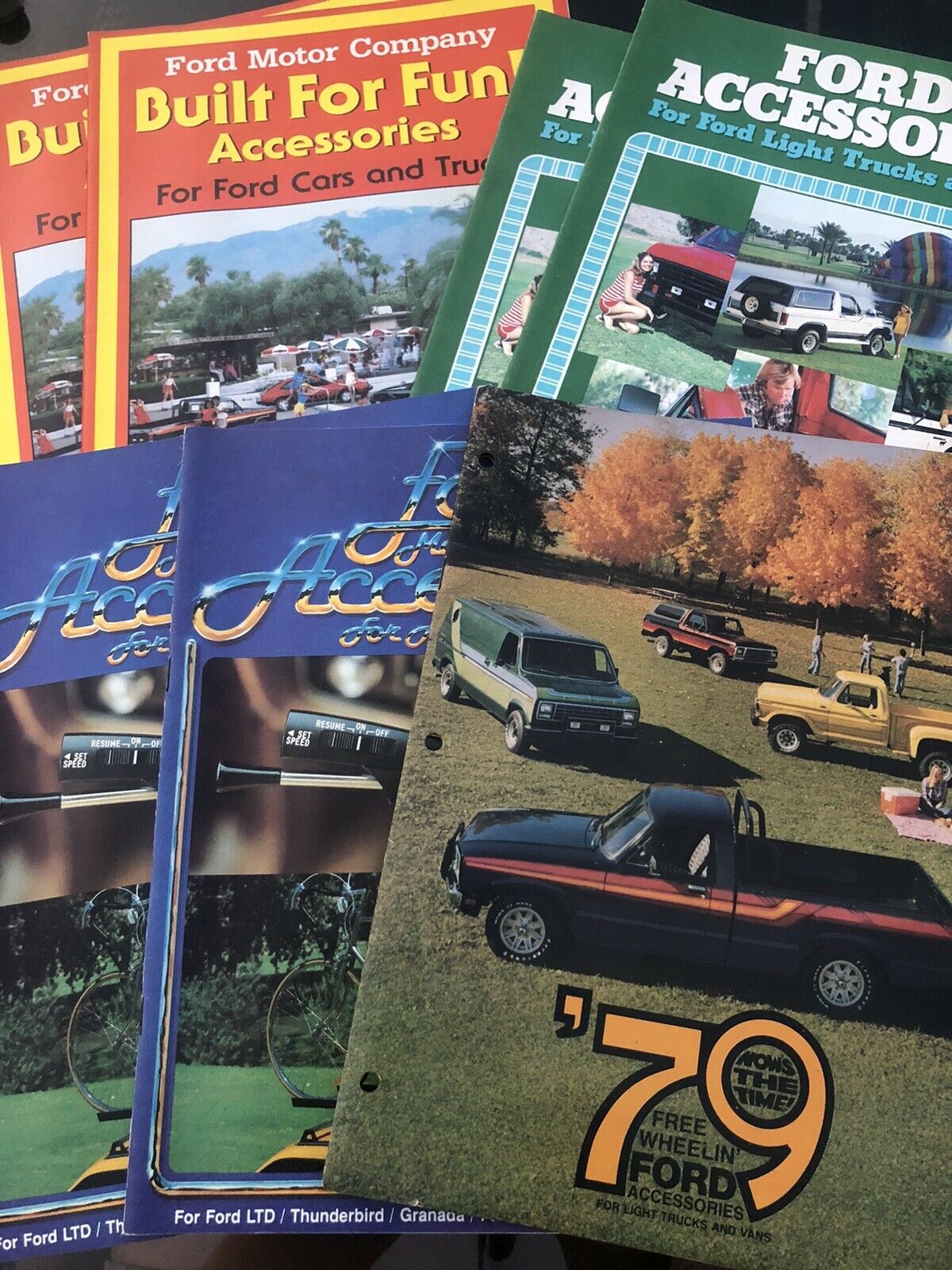-40%
1989 FORD TEMPO Sales Brochure PROMOTIONAL Automobile AUTO Motor Company FMC Car
$ 7.91
- Description
- Size Guide
Description
FORD TEMPO BROCHUREFREE SHIPPING with delivery confirmation on all domestic purchases!
Nice large sales brochure for the 1989 Ford Tempo. 23 pages.
We ship worldwide! Please see all pictures and visit
our eBay store and other eBay auctions!
The
Ford Tempo
and its twin, the
Mercury Topaz
are
compact cars
that were produced by
Ford
for
model years
1984 to 1994. They were downsized successors to the boxy
Ford Fairmont
and
Mercury Zephyr
twins. The Tempo and Topaz were part of a rejuvenation plan by Ford to offer more environmentally friendly, fuel efficient, and more modern styled models to compete with the imports. While the car sold well, its innovation and aerodynamic design paved the way for the even more groundbreaking
Ford Taurus
.
[
1
]
The Tempo and Topaz were replaced in 1994 by the
"world car platform"
Ford Contour
and
Mercury Mystique
, respectively.
Development
[
edit
]
The design and life of the Tempo began in the late 1970s as Ford was gearing to build towards a more ergonomic, more efficient, and more aerodynamic design philosophy. The new design philosophy rested in part due to aging vehicle platforms, and two oil embargoes which led to a rise in more fuel-efficient import vehicle sales. Taking note of this, Ford set out to revolutionize the automotive industry, and would later lay the groundwork for three revolutionary vehicles: The 1983
Thunderbird
(and its
Mercury
counterpart, the
Cougar
), the 1984 Tempo (and its Mercury counterpart, the Topaz), and the yet-to be released
Taurus
(and its Mercury counterpart, the
Sable
). The Tempo and Topaz would be based on a stretched version of the front-wheel-drive
Ford CE14 platform
used on the
Ford Escort
, but with a radical new body. Being based on the CE14 platform meant the Tempo and Topaz, unlike its Fairmont and Zephyr predecessors, were
front-wheel-drive
. By making them front-wheel drive, interior space was much larger than if they had been
rear-wheel-drive
. The transaxle designs also borrowed heavily from the Ford Escort. However, there were few common components due to the Tempo and Topaz's larger size.
In December 1978, wind tunnel testing began on the Tempo, with more than 450 hours of testing resulting in more than 950 different design changes. As part of these changes, the Tempo and Topaz both featured a 60° windshield, matching that of the new Thunderbird and Cougar. Also new were the aircraft-inspired door frames, which originally appeared on the Thunderbird/Cougar. These door frames wrapped up over the edge of the roof, improved sealing, allowed for hidden drip rails, and cleaned up the A-pillar area of the car significantly. The rear track was also widened, creating more aerodynamic efficiency. The front grille was laid back more and the leading edge of the hood was tuned for aerodynamic cleanliness. Wheels were pushed out to the edges of the body, decreasing areas where air turbulence would be created. The rear of the cars were treated to just as many changes. The rear window was laid down at 60 degrees as well, and the trunk lid was raised higher than the side windows. This allowed the air to flow off the car more smoothly, and allowed for greater fuel efficiency. From the side view, this raised trunk created a wedge look to the car which was especially prominent on the two-door coupe versions.
All of these changes created a coefficient of drag (Cd) of 0.36 for the 2-door car (0.37 for the 4-door), which was equal to the Cd of the new "Aero"
Ford Thunderbird
. The final design of the cars was reached so that the car looked good on every trim level, not just the top-of-the-line as some of the competition had done. When the Tempo was released in 1983 as a 1984 model, it became an instant hit, with more than 107,000 two-door models and more than 295,000 four-door models being sold in the first year alone. Initial advertising featured a Tempo sedan performing a loop on a stunt track. The commercials touted the Tempo as being "America's all new aerodynamic sedan" and listed features such as "the world's most advanced automotive computer" that claimed to have the ability to monitor up to seven vital engine functions, and noted the interior to be roomier in the rear seat than a
Mercedes-Benz 300D
. Other ads featured the slogan "Pick up the Tempo of your life!"
First generation
[
edit
]
First generation
Overview
Production
1984-1987 (Sedan)
1984–1994 (Coupe)
Body and chassis
Body style
2-door
coupe
4-door
sedan
Related
Ford Escort / Mercury Lynx
Ford EXP
Powertrain
Engine
2.0 L
Mazda
RF
I4
(
diesel
)
2.3 L
HSC
I4
(
gasoline
)
2.3 L
HSO
I4
(gasoline)
Transmission
3-speed
ATX/FLC
automatic
4-speed
IB4
manual
5-speed
MTX-III
manual
Dimensions
Wheelbase
99.9 in (2,537 mm)
Length
176.7 in (4,488 mm)
Width
68.3 in (1,735 mm)
Height
52.7 in (1,339 mm)
The first generation Tempo and Topaz, were released in 1983
[
citation needed
]
as 1984 models, and equaled the length of a
Chevrolet Cavalier
at the time, to which it was a response. The Ford Fairmont (with its 105.5-inch wheelbase), which was last produced in 1983, was actually more directly replaced by the
Ford LTD
(with its 105.6-inch wheelbase), which was introduced in 1983.
Even though the Fairmont (at 105.5-inch wheelbase and 193.8-inch length) was sized much larger than
General Motors
'
front-wheel drive
Chevrolet Celebrity
mid-size car
(at 104.8-inch wheelbase and 188.3-inch length) and had similar length to the Fairmont's predecessor, the
Maverick
(at 109.9-inch wheelbase and 193.9-inch length), the Tempo had been meant as the
sedan
and
coupe
versions of the
Ford Escort
, and both vehicles were in similar classes, similar to how
Volkswagen
's sedan and coupe answer to the
Golf
hatchbacks would be the
Jetta
.
1987 Topaz sedan
The Tempo was Ford's first
compact car
downsizing, just seven years after GM downsized its cars in 1976 for the 1977 model year (some of them in 1978 or later). Both the front
windshield
and rear window were set at 60° angles, with the trunk of the car being placed higher than the side windows to allow for greater fuel efficiency and air flow. On the Tempo, a rear quarter window was present while the Topaz received a more formal C-pillar arrangement minus the window. The front of the car featured a set of two sealed-beam halogen headlamps recessed in chrome "buckets" and the grille in between the headlights featured four horizontally thin rails each swept back to allow for greater air flow into the engine compartment and over the hood. The Tempo shared much of its design language with the
European
Ford Sierra
, launched one year prior.
The first generation Tempo came standard with a new 2.3 L
HSC
inline four-cylinder gasoline engine with a one-barrel carburetor, with an optional Mazda-built
four-cylinder
diesel engine. Mated to either of these engines were the choice of a standard four-speed
IB4
or optional five-speed
MTX-III
manual transmission
(which was the standard, and only option for the diesel engine variant), or the optional 3-speed
FLC
automatic
with a floor-mounted shift lever. In late 1985, the 5-speed manual became standard and the 4-speed was discontinued. In addition, a slight modification was made to the 5 speed transmission, moving the "reverse" position on the gear shift knob from right beside first gear to the opposite bottom corner. This was done to decrease the possibility of mistakenly shifting into reverse rather than 1st gear during takeoff. The instrument panel featured a new, easier to read gauge layout, with all switches and controls placed within easy reach of the driver. In 1985, the Tempo became the first production sedan to feature a driver's side airbag.
[
2
]
1986–1987 Ford Tempo sedan
In 1986, the Tempo and the Topaz saw several moderate design changes which coincided with the release of the then-new and revolutionary 1986
Taurus
. While generally the same car, the front and rear end styling was where the changes were most evident. The standard rectangular sealed-beam halogen headlamps were replaced with a new, plastic composite design which only required replacement of the bulb itself. These new headlights were flush-mounted to match the redesigned front corner lights and a freshly restyled grille, which also closely matched that of the Taurus (the Topaz received a pseudo-lightbar grille styled after the
Sable
). For the rear end, the trunk and taillights were slightly restyled, giving the car a sharper look. Replacing the carburetor on the 2.3 L four-cylinder engine was a new
Central Fuel Injection
(CFI) system (the carbureted version was still available in Canada until 1987). New was an optional "LX" luxury trim, replacing the GLX. Other changes and improvements included the addition of automatically retracting front seatbelt shoulder straps, and the addition of a new all-wheel-drive model. The Tempo AWD included special badging, interior badges. Other available features included power lumbar support, four-way power driver's seat and a cassette player.
From 1986 to 1987, there was also the Sport GL, which included unique interior and exterior styling cues, an HSO (High Specific Output) version of the 2.3L HSC engine (slightly more power), alloy wheels, tachometer, and a quicker gear ratio for the 5-speed manual transaxle (3.73 final drive). It was badged simply as "GL", however a Sport GL is easily recognizable because it lacks the GL's chrome front and rear bumpers. In 1987, the Mercury Topaz received a standard all wheel drive system on the trim levels GS-AWD and LS-AWD. This AWD system (developed exclusively for the Tempo and Topaz) was available for model years 1987 to 1991.
Trim levels for the first generation Tempo are as follows:
L (entry level model)
GL (mid-level and by far the best-selling model)
LX (introduced in 1986 as the luxury model, replacing the GLX)
GLX (1984 and 1985 only)
AWD (1987 only, only year AWD could be had on a Coupe bodystyle)
Trim levels for the first generation Topaz are as follows:
L (stripped down base model available in 1984 model year)
GS (Topaz equivalent of the Tempo GL, mid-range model and most common, available between 1984 and 1994 model years)
GS-AWD (Topaz GS with All Wheel Drive as standard, available between 1987 and 1991)
LS (luxury/high end trim level, discontinued after 1992)
LS-AWD (Topaz LS with All Wheel Drive as standard, available between 1987 and 1991)
XR5 (Topaz Coupe's sport performance model made from 1987 to 1992, in 1992, XR5 received a standard 3.0L V6. All XR5s are 2-doors)
1988 and 1992 coupe facelifts
[
edit
]
For 1988, Ford redesigned the Tempo and Topaz, however leaving the rear body of the 2-door very similar to the original model (with only updated tail lamps and rear bumpers that more closely resembled the sedan). The last facelift occurred in 1992.
1988–1991 Ford Tempo coupe
1992–1994 Ford Tempo coupe
Second generation
[
edit
]
Second generation
Overview
Production
1988-1994
Body and chassis
Body style
4-door
sedan
Related
Ford Escort / Mercury Lynx
Ford EXP
Powertrain
Engine
2.3 L
HSC
I4
(
gasoline
)
2.3 L
HSO
I4
(gasoline)
3.0 L
Vulcan
V6
(gasoline)
Transmission
3-speed
ATX/FLC
automatic
5-speed
MTX-III
manual
5-speed
MTX-IV
manual
Dimensions
Wheelbase
99.9 in (2,537 mm)
Length
177.0 in (4,496 mm)
Width
68.3 in (1,735 mm)
Height
52.9 in (1,344 mm)
Curb weight
2,723 lb (1,235 kg)
The Tempo and Topaz sedans received a major redesign in 1988, whereas the coupes were facelifted instead. The changes gave the Tempo and Topaz an even more similar look to the Taurus and Sable, respectively. On the front end of the Tempo, a completely restyled grille featured three thin horizontal chrome bands with a Ford oval in the center, with two composite flush-mounted rectangular headlamps with restyled front turn signal housings on either side. On the Tempo GLS, this chrome grille was blacked out, and they received a blacked-out "D" pillar. For the rear, the taillights received a major rework on the and were now completely flush-mounted. A restyled rear quarter window was designed to match and blend evenly with the completely restyled rear door trim. The Topaz was differentiated from the Tempo by a more formal rear window, a waterfall grille, more upscale wheels, and solid red tail-lights.
The interior of both the sedan and coupe models saw a brand new instrument panel design, with a central gauge cluster (now with a standard engine temp gauge), and more ergonomic driver controls. Fan and windshield wiper controls were now mounted on rotary-style switches on either side of the instrument panel, and the HVAC controls received a new push-button control layout. Other changes included reworked interior door panels. Also, starting in 1988 a driver's side airbag was optional, a rarity then for an economy level car. On Tempo LX and AWD, the interior received chrome and wood trim on the dashboard and doors. Topaz models featured the tachometer-equipped gauge cluster and a front center armrest standard.
1992–1994 Mercury Topaz GS sedan
1991 (the last year of the 1988 restyled look) saw the discontinuation of the all-wheel-drive model Tempo and Topaz, as well as the now Canadian market exclusive entry level model Tempo L. 1992 saw a minor redesign. The Tempo gained body color side trim to replace the black and chrome trim, as well as full body colored bumpers. The three bar chrome grille was also replaced by a new, body colored monochromatic grille. And the Topaz's chrome grille was replaced with a new light-bar (nonfunctional).
Also in 1992, a new engine, a 3.0 L
Vulcan
V6
, was introduced as optional on the GL and LX, and standard on the GLS. 1992 would be the last year of the GLS, as it was discontinued (along with its Topaz counterpart) in 1993. This left Tempo with only two trim level options, GL and LX. 1992 also brought about a slightly redesigned gauge cluster, with tachometers now reading up to 7,000 RPM instead of the previous 6,000 RPM. Also, a fuel door indicator was added to the fuel gauge (an arrow pointing to the side of the car where the fuel door was located). 1992 was the only year for US models to have an available 120 MPH speedometer (GLS, XR5 and LTS models only); all other model years read to 85 MPH. 1994 was the last model year for the Ford Tempo (and Mercury Topaz). Production halted in the first quarter of 1994.
Trim levels for the second generation Ford Tempo are as follows:
L (entry level model, discontinued in 1991)
GL (mid-level model)
AWD (advertised by Ford as a separate trim level, AWD was actually built on an LX body, as evidenced by the body code. Discontinued in 1991)
LX (luxury model, only available as a four-door sedan)
GLS (replaced Sport GL as the performance oriented model, discontinued in 1992)
Trim levels for the second generation Mercury Topaz are as follows:
GS (Topaz equivalent of the Tempo GL, mid-range model and most common, available between 1984 and 1994 model years)
GS-AWD (Topaz GS with All Wheel Drive as standard, available between 1987 and 1991)
LS (luxury/high end trim level, discontinued after 1992)
LS-AWD (Topaz LS with All Wheel Drive as standard, available between 1987 and 1991)
XR5 (Topaz Coupe's sport performance model made from 1987 to 1992, in 1992, XR5 received a standard 3.0L V6. All XR5s are 2-doors)
LTS (four door variation of the XR5, 'LTS' stood for Luxury Touring Sedan, made from 1988 to 1992)
End of production
[
edit
]
In the early 1990s, Ford chose to develop a new platform for the aforementioned Contour and Mystique rather than redesign the Tempo and Topaz in the mid 1990s to meet new safety standards (dual airbags, etc.). While highly innovative in its early years, and even though it was a strong seller for nearly its entire lifetime, by the early 1990s the Tempo and the Topaz were seen as an aging platform. The lack of an overdrive automatic was a sore spot when compared to newer designs having 4-speeds. It was also to be the last year for the 2.3 L
HSC
engine, which was built by Ford specifically for the Tempo and Topaz. Also, it was to be the last year for the 3-speed automatic version of this transaxle; although it was slightly redesigned, given overdrive, and was used on the Ford Escort/Mercury Tracer/Mazda 323/Kia Sephia. With all of these factors, Ford stopped production of the Tempo on March 25, 1994, when the last one rolled off the Claycomo, Missouri assembly line. It was succeeded by the
Contour
, a derivative of the European
Ford Mondeo
. It came with a jump in price: the most expensive 1994 Tempo (a loaded LX sedan with a V6) was about US,900 (,620 in 2014 dollars), while a base model 1995 Contour (GL with four-cylinder engine and manual transmission) was ,990 (,361 in 2014 dollars). The last Ford Tempo and Topaz rolled off the Oakville, Ontario, Canada assembly line on May 20, 1994.
The new-for-1995
Ford Windstar
was then built at the
Ontario
plant that formerly built the Tempo and Topaz, while Kansas City turned over to
Ford Contour
/
Mercury Mystique
production (shared with a plant in
Hermosillo, Mexico
). Today, the
Ford Fusion
occupies the same market niche that the Tempo and Topaz once did.
Production figures
[
edit
]
The Ford Tempo was a massive sales success for Ford. It was one of the top ten best selling cars in the US, usually in the top five, during its entire production. In 1984, Ford sold a total of 531,468 examples of the Tempo and Topaz,
[
3
]
nearly 100,000 more units than the best-selling
Toyota Camry
(2006) of today. Below is a list of annual model year production figures for the Tempo.
[
4
]
1984: 402,214
1985: 339,087
1986: 277,671
1987: 282,632
1988: 313,262
1989: 240,904
1990: 218,426
1991: 185,845
1992: 207,340
1993: 154,762
1994: 110,399
Total: 2,732,542
References
[
edit
]
Jump up
^
the Auto Editors of Consumer Guide (2007-06-11).
"Ford Tempo and Taurus"
. Auto.howstuffworks.com
. Retrieved
2010-12-03
.
Jump up
^
"Today in Ford History: Jan. 7"
.
Media.Ford.com
. 2007-01-07
. Retrieved
2007-03-03
.
[
dead link
]
Jump up
^
"1984 – Tempo-Topaz Introduction"
.
Tempo Topaz Car Club of North America
. Retrieved
2009-10-16
.
Jump up
^
"Tempo-Topaz History: Year-by-Year"
.
Tempo Topaz Car Club of North America
. Retrieved
2009-10-16
.
External links
[
edit
]
Wikimedia Commons has media related to
Ford Tempo
.
Wikimedia Commons has media related to
Mercury Topaz
.
Tempo Topaz Car Club of America
Tempo and Topaz Owner Association
Ford Tempo Central
MSNAutos: Ford Tempo
_______________________________________________________________
Why Buy From Chestnut Hill Books?
Chestnut Hill Books has a perfect 100% feedback rating dating over 13 years and spanning 18,000+ transactions, with customers in all 50 states and over 85 countries on 6 continents. Our detailed seller ratings (item as described, communication, shipping time and shipping and handling charges) are among the best on eBay. All domestic purchases come with free shipping and complimentary delivery confirmation, trackable through
the United States Post Office.
Our items have low starting prices well below their actual value, and reserve prices are rarely employed. Thank you for looking at our items - please browse our other auctions this week!
Payment:
Payment is due within 7 days of the auction's end date. Contact us
for special payment requests/options. If payment cannot be produced within the 7 day period, please send a message immediately indicating when payment should be expected, otherwise an unpaid item dispute will be filed with eBay.
Where Do We Ship?
Chestnut Hill Books ships to every country in the world at reasonable rates as suggested by the United States Postal Service.
Please contact us for a specific international shipping quote before bidding should you have any questions.
Shipping Terms:
Our auctions end on Sunday evenings; if payment is made immediately, your item will usually be mailed within 24 hours of payment receipt.
All items are securely packed to ensure safe shipping. Postcards are mailed between sturdy cardboard. All domestic shipments come with complimentary delivery confirmation, trackable through
the USPS
. Auction winners will receive an e-mail from PayPal with tracking information and related links; please refer to this e-mail before contacting us with questions on the status of your package, as we will have as much delivery information as you. Zero profit is made on international shipping & handling charges; domestic shipping is free.
Return Policy:
We strive to describe each item completely and accurately. However, if you feel an item was not described correctly, the item can be returned at our expense within 30 days of receipt for a refund of your original payment. It is requested that you contact us immediately
should you have any question about the condition or representation of your item.
Who Are We?
Chestnut Hill Books is a family-owned antiques business based out of the SouthCoast, Massachusetts. We collect historical items related to New Bedford, Massachusetts and the surrounding area (Dartmouth, Fairhaven, Westport etc), Boston College (tickets, programs, pennants, postcards, scrapbooks, pinbacks, sports & non-sports etc), Massachusetts political buttons & memorabilia and Mount Monadnock in Jaffrey, New Hampshire. Please contact us if you have any collectibles in those categories.
Other:
Please do not hesitate to contact us with any other questions/comments. We normally respond to all inquiries in a timely manner. Don't forget to check our weekly auctions, with new items posted on most Sunday evenings. Also, please do not forget to leave positive feedback upon item receipt! Thank you for looking at our auctions!
_______________________________________________________________


